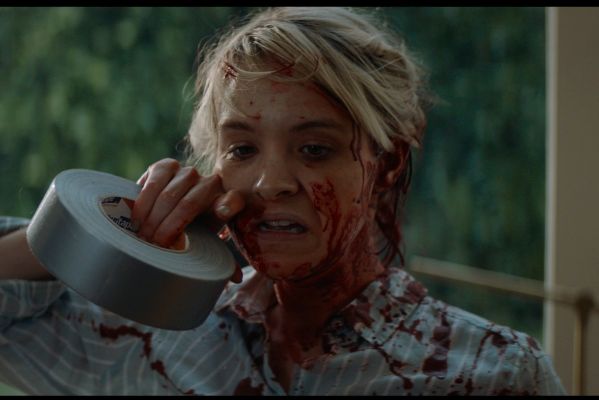‘That’s the man that comes every night and tries to kill us,’ is a very weird sentence to deliver in a blasé deadpan, especially when the person saying it is your husband. Successful self-help writer May (Brea Grant) finds herself in this outlandish and terrifying situation as she spies a masked figure out in the yard. Even more worrying is that this is apparently her ‘new normal’ and no one had let her in on the fact. Drawing on the familiar tropes of Halloween, the self-aware slasher revival of Scream and the Groundhog Day absurdism of Happy Death Day and Vivarium, writer and star Grant and director Natasha Kermani’s furious and fatalistically funny Lucky is going to garner nods of recognition and eye rolls alike.
After being attacked in their home, May and husband Ted (Dhruv Uday Singh) manage to kill the intruder – an impassive, blank Michael Myers type – but the body vanishes mysteriously. The attacker inexplicably returns the next evening, where May is alone after an argument with Ted. Again, she fights him off only for the body to disappear. Police are less than helpful, and her female friends and family are acting strangely. May begins to piece together her circumstances from innocuous moments – was that a scream she heard that night in the car park? Why was there a shard of broken glass on the table? And why has she never noticed the scar on her sister-in-law’s shoulder before?
Brea Grant plays May’s predicament to perfection. Sometimes the ego is apparent when a writer pens a role for themself, but Grant steadily takes May to bits to truly see what she’s made of. May is hardly ever offscreen, which makes the viewers’ empathy with her heavily subjective. Far from a damsel-in-distress, her status as a self-help writer suggests a strong personality with large reserves of resourcefulness and stoicism and Grant perhaps allows us a measure of schadenfreude. It becomes nigh on impossible not find some grim amusement in her quest for the truth as the killer appears yet again to peck at her like the eagles of Prometheus. The actress is becoming an incredibly reliable name in the genre as a triple-threat talent, appearing recently in Jeremy Gardner‘s After Midnight, and writing and directing 12 Hour Shift (also at Fantasia), and seems to excel on all fronts.
Lucky manages to subvert expectations throughout a runtime slashed more mercilessly than any of its characters. The frequent attacks suffered by May are short, sharp shocks you assume will escalate in their repetition. Initially, the worry is this will blunt the film’s impact, as they are over very quickly, shot in dim light, and not staged as well as other home invasion films like, for example, Mike Flanagan‘s Hush. However, the point isn’t so much these sequences in and of themselves, but the cumulative toll they take on May, in which lies the film’s incandescent message.
That message is delivered with blunt force trauma. Even the title is designed to be spat with incredulous rage. As with Sophia Takal‘s remake of Black Christmas last year, many will write off Lucky‘s belligerent feminist message and foghorn metaphor as clunky writing, instead of the bitter satire it actually is. Grant and Kermani no doubt understand the direct simplicity they employ means it will be dismissed by those it most explicitly targets, but above all Lucky is more about looking for appreciation for a woman’s lot. There is no crowd-pleasing, fist-pumping moment of sisterhood (in which Black Christmas absolutely indulged); in fact, it’s shown just how exhausting it is to express solidarity with others when May’s own plight is so relentless. It isn’t nihilistic per se – it simply says; ‘We get it. We understand.’
Such is the force of its anger, Lucky does feel like a large part of the narrative is at the service of its central premise. It switches to that track with a very abrupt switch of tone, and not every question it raises gets answered. There are certain choices which are not entirely clear, such as May’s apparent partial amnesia. Nevertheless, Lucky manages to be simultaneously absurd and deadly serious, which is no mean feat. What it says about the female experience is admittedly bleak, but its wry laughter is infectious.
Screened as part of Fantasia Festival
